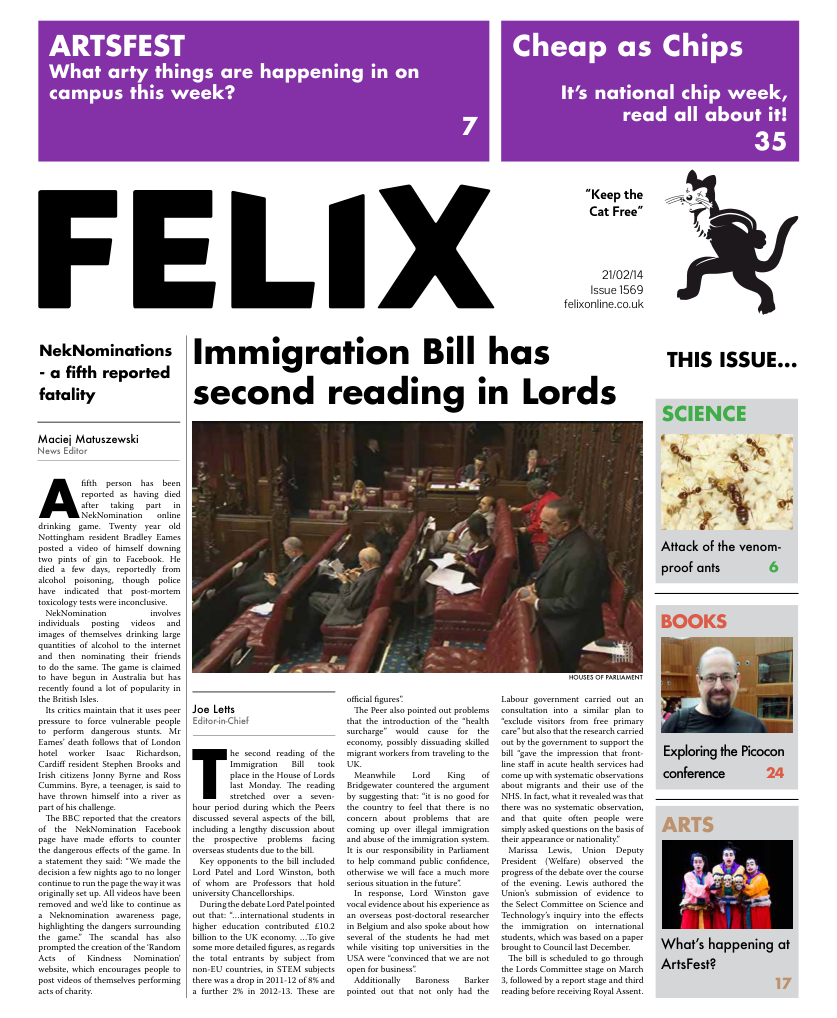Benefits Britain and the ethics of TV-making
Grace Rahman asks whether a live debate was necessary
As a self-confessed fan of Benefits Street, I was confused at the break in the series two weeks back, which was followed by an announcement that Channel 4 was capitalising further on the few weeks of column inches the show had earned them by staging a debate on benefits.
It promised to feature the not very guilty looking programme makers, journalists with middle class axes to grind and politicians with pre-prepared sound bites of their own. It was being recorded a whole month after Newsnight had quizzed a doe-eyed producer, LBC had got resident ‘White Dee’ to participate in a call-in with an unprepared Nick Clegg, and everyone else and their uncle had stopped talking about it. Presumably this was because the possibility of a second series has been quashed by the fact that the show’s biggest characters now get “between 50 and 100 knocks on the door a day” and the guy trying to sell cups of detergent for 50p door to door only gets asked for photographs nowadays.
The show was preceded by a half an hour long Benefits Street: The Last Word, a lazy but vaguely interesting refresher showing some of the characters’ best bits as well as a chance to see their new post-fame haircuts. Throughout this week, awkward adverts featuring James Turner Street residents invited us to share our thoughts using #BenefitsBritain, reminding us that a debate was on the horizon. It began, quite uncomfortably, straight off the back of the last instalment of the docu-soap.
Richard Bacon looked excited; he had a post-watershed hour and a studio audience rife with opinion. He wasn’t a Blue Peter presenter anymore, he was Matthew Wright, Jeremy Kyle and Paxman combined. He pre-emptively warned us of fruity language and rowdy debate. There were cross-armed, unimpressed looking James Turner Street residents in one corner, who seemed happy to be represented by White Dee (who went as just Dee this evening, as the other one hadn’t made an appearance) sitting across the room from the very journalists who had condemned them. At this point, the show had promise.
Things began tempestuously with journalist Allison Pearson (under pressure from a hysterical Bacon) being forced to repeat the ridiculous implication of her article: that Dee just seemed too cheerful onscreen to have depression. This coupled with a mention of her horrendous ‘Mick Philpott, a good reason to cut benefits’ piece for The Daily Telegraph seemed all too much, and wily tweeters noticed that 45 minutes in she had disappeared from the front row. Maybe she had somewhere to be. You get the sense that Katy Hopkins wouldn’t have been so shy and (literally) retiring.
To Pearson’s credit, she had questioned the usual lack of female panellists. On an initial glance, the left was better represented, with the Tories having to resort to their secret weapon, a rare state-educated MP: ex-fireman Mike Penning. The show really fell down with Bacon though, who took 45 minutes to warm up to the idea of controlling such a passionate panel. There was heckling from the back, incoherent rants from the self-made CEOs of The Big Issue and Pimlico Plumbers (whose mullet was more distracting than the F-bomb he dropped) and a lot of it made for quite uncomfortable viewing (in true middle class fashion I often had to mute the TV and rely on Zoe Williams’ live blogging of the event for The Guardian).
But, unsurprisingly, the debate didn’t focus on the most interesting point, and the one that anyone had any real chance of getting to the heart of in an hour: whether or not the production company had acted responsibly in its treatment and portrayal of residents of James Turner Street, and how aware they were of the furore the program would create. Understandably, to make a representative series they had to shoot for 18 months or so, but as Benefits Street’s detractors and some appearing on the debate pointed out, a lot of positive footage seemed to have been left out. None of the recurring faces were in work, and between them had admitted to armed robbery, benefit fraud and stealing from an employer. According to White Dee 10% of the street were employed, but perhaps their sound bites weren’t as shocking, or their storylines less easy to edit into five episodes. These residents certainly weren’t in the debate’s audience.
I’m not going to offer my vague, oft-repeated opinions on the social security system in the UK, but I am writing this show off a limp finale to a divisive but thoroughly watchable series. The debate should have at least attempted to address the ethics behind production or been handled better by Bacon. A quote from Charlie Brooker’s ‘Weekly Wipe’ was featured in the media reaction segment (I’m sure to his amusement), and was probably the most sensible thing said on the matter. Although the producers argue that they were portraying members of a community, often helping each other, they still chose to call it the provocative title of Benefits Street, with the connotations that conjured even prior to watching.
As the show winds down, Bacon asks what I too have been pondering: has any good come of this? One woman sensibly claims that it’s unveiled levels of poverty in this country which some viewers may have been unaware of, but then a second starts arguing against democracy. Yikes. 8 out of 10 Cats can’t come quickly enough.





